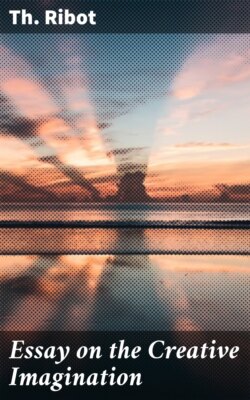Читать книгу Essay on the Creative Imagination - Th. Ribot - Страница 11
На сайте Литреса книга снята с продажи.
II
ОглавлениеTable of Contents
Since the chief aim of this study is to prove that the basis of invention must be sought in motor manifestations, I shall not hesitate to dwell on it, and I take the subject up again under another, clearer, more precise, and more psychological form, in putting the following question: Which one among the various modes of mind-activity offers the closest analogy to the creative imagination? I unhesitatingly answer, voluntary activity: Imagination, in the intellectual order, is the equivalent of will in the realm of movements. Let us justify this comparison by some proof.
1. Likeness of development in the two instances. Growth of voluntary control is progressive, slow, crossed and checked. The individual has to become master of his muscles and by their agency extend his sway over other things. Reflexes, instinctive movements, and movements expressive of emotion constitute the primary material of voluntary movements. The will has no movements of its own as an inheritance: it must coördinate and associate, since it separates in order to form new associations. It reigns by right of conquest, not by right of birth. In like manner, the creative imagination does not rise completely armed. Its raw materials are images, which here correspond to muscular movements. It goes through a period of trial. It always is, at the start (for reasons indicated later on), an imitation; it attains its complex forms only through a process of growth.
2. But this first comparison does not go to the bottom of the matter; there are yet deeper analogies. First, the completely subjective character of both instances. The imagination is subjective, personal, anthropocentric; its movement is from within outwards toward an objectification. The understanding, i.e., the intellect in the restricted sense, has opposite characteristics—it is objective, impersonal, receives from outside. For the creative imagination the inner world is the regulator; there is a preponderance of the inner over the outer. For the understanding, the outside world is the regulator; there is a preponderance of the outer over the inner. The world of my imagination is my world as opposed to the world of my understanding, which is the world of all my fellow creatures. On the other hand, as regards the will, we might repeat exactly, word for word, what we have just said of the imagination. This is unnecessary. Back of both, then, we have our true cause, whatever may be our opinion concerning the ultimate nature of causation and of will.
3. Both imagination and will have a teleological character, and act only with a view toward an end, being thus the opposite of the understanding, which, as such, limits itself to proof. We are always wanting something, be it worthless or important. We are always inventing for an end—whether in the case of a Napoleon imagining a plan of campaign, or a cook making up a new dish. In both instances there is now a simple end attained by immediate means, now a complex and distant goal presupposing subordinate ends which are means in relation to the final end. In both cases there is a vis a tergo designated by the vague term "spontaneity," which we shall attempt to make clear later, and a vis a fronte, an attracting movement.
4. Added to this analogy as regards their nature, there are other, secondary likenesses between the abortive forms of the creative imagination and the impotent forms of the will. In its normal and complete form will culminates in an act; but with wavering characters and sufferers from abulia deliberation never ends, or the resolution remains inert, incapable of realization, of asserting itself in practice. The creative imagination also, in its complete form, has a tendency to become objectified, to assert itself in a work that shall exist not only for the creator but for everybody. On the contrary, with dreamers pure and simple, the imagination remains a vaguely sketched inner affair; it is not embodied in any esthetic or practical invention. Revery is the equivalent of weak desires; dreamers are the abulics of the creative imagination.
It is unnecessary to add that the similarity established here between the will and the imagination is only partial and has as its aim only to bring to light the rôle of the motor elements. Surely no one will confuse two aspects of our psychic life that are so distinct, and it would be foolish to delay in order to enumerate the differences. The characteristic of novelty should by itself suffice, since it is the special and indispensable mark of invention, and for volition is only accessory: The extraction of a tooth requires of the patient as much effort the second time as the first, although it is no longer a novelty.
After these preliminary remarks we must go on to the analysis of the creative imagination, in order to understand its nature in so far as that is accessible with our existing means. It is, indeed, a tertiary formation in mental life, if we assume a primary layer (sensations and simple emotions), and a secondary (images and their associations, certain elementary logical operations, etc.). Being composite, it may be decomposed into its constituent elements, which we shall study under these three headings, viz., the intellectual factor, the affective or emotional factor, and the unconscious factor. But that is not enough; the analysis should be completed by a synthesis. All imaginative creation, great or small, is organic, requires a unifying principle: there is then also a synthetic factor, which it will be necessary to determine.
